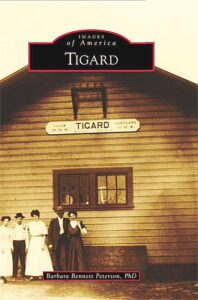
The history of Cook Park is linked to John E. Cook (1926-2017), who entered public life while serving on Tigard’s Park Advisory Committee in the early 1960s. The Park Advisory Committee was composed of six people, five private citizens and one member from the Tigard City Council and was charged with finding a suitable open space for Tigard’s main public park. The Committee found property along the Tualatin River—a 36-acre parcel that had already been deeded to Washington County. However, Washington County did not have the funds to develop this land parcel into a proper public park, and John E. Cook was instrumental in convincing Washington County to deed the 36-acre land parcel to Tigard in the summer of 1962.

Largely wooded, the potential park had open sections for recreational developments. Mother nature assisted in the future park’s development when, in October 1962, the Columbus Day Storm uprooted many trees in the as-yet undeveloped park area. John E. Cook organized a cleanup public citizen’s group through the Park Advisory Committee composed of Marine Reservists, the Chamber of Commerce, the local Jaycees, and the Lions Club members who turned out to offer their aid. During cleanup, an old well was discovered on the park lands and was made operational at a time when city water did not yet extend to the developing parkland. Fallen trees were removed.

An opening ceremony for Tigard Park was held in 1964. John E. Cook continued fundraising with BBQ chicken roasts and sales, selling over a thousand pounds of BBQ per year to make certain the new park succeeded. New facilities and recreational sites were added. Cook replaced Julia Tigard on the Washington County Park Board and accelerated his efforts to beautify and expand the new park in Tigard along the river. Cook sought public environmental dollars to establish wetlands and develop green space. His efforts were supported by the Tualatin Hills Parks and Recreation District.
Making Tigard Park accessible to the public was a challenge. It was facilitated by an agreement between John C. Bilyeu who owned the home today known as the Quello House, Tigard School District, and the City of Tigard. A public access road was created from Durham Road down into the park, with property donated by both John Bilyeu and Tigard High School for the public road down to the Tualatin River. So successful were the efforts of John E. Cook in securing the original 36-acre parcel of property deeded for the park, fundraising for its development, and securing public access that the new park was re-named for him in the early 1970s. Cook Park has continued to expand as the city has purchased additional portions of adjacent land for the soccer field and the Butterfly Garden.

John E. Cook was born in Portland in 1926, attended Central Catholic High School from 1940 to 1944, and then spent two years in the Navy during World War II. After the war, he attended Oregon Agriculture College, later OSU, from 1946 through 1950, when he graduated with a degree in Pharmacy and entered his professional career as a pharmacist. Following a brief stint again on active military duty during the Korean War, he resumed his career as a pharmacist in 1952. He married Pam Spohn Cook, had two children, Julie and John, moved to Tigard in 1957 and opened his own Pharmacy in Canterbury Square, which he ran until 1982. John E. Cook became a member of the Tigard Chamber of Commerce and served as one of its presidents. He became a pillar of the Tigard community and was named Tigard’s First Citizen in 1982 for public service. He worked for the State Board of Pharmacy from 1982 through 1992, which set pharmacy standards and regulations.





May 17 from 5:30 to 8 p.m. Come enjoy live music, community booths, and recreation activities. Courtesy/ City of Tigard
Cook served on Tigard’s City Council for twelve years and was elected Tigard’s Mayor in 1984, then retired in 1986. His son, John L. Cook, was elected Tigard’s Mayor in 2012. John E. Cook’s visible legacy is Cook Park (17005 SW 92nd Avenue). Today the park contains 79 acres, 2.5 miles of roads and trails, baseball and soccer fields, park shelters with cooking facilities, river access and boat ramp, a playground, picnic tables, wetlands, and the Tupling Butterfly Garden. Near the baseball field is the City of Tigard’s Centenarian Plaque honoring all citizens who lived to be 100. The plaque is maintained by the Girl Scouts Ti-Tu-Me-Wood Chapter. Cook Park’s soccer field is the annual site of the Tigard Balloon Festival.

Parks are nature-based solutions to help combat climate change because urban cities are heat islands, and parks offer a cool respite. Trees extract carbon from the air and store pollutants. Beautiful landscapes are sanctuaries for mental well-being, and Cook Park sustains our sense of community.
A new facility at Cook Park is being added called the Inclusive Playground which will open on May 17, 2024, and accommodate wheelchair bound guests.
Cook Park was recently renamed Cook Family Park to also honor John L. Cook’s service to Tigard as well as his father’s.
To become a member, volunteer, or for more information about the Tigard Historical Association visit www.tigardhistorical.org.





















